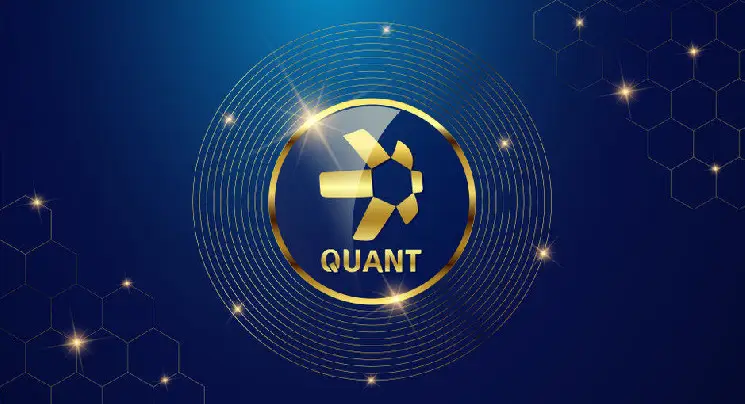QNT
$ 131.96 USD
$ 131.96 USD
$ 1.329 billion USD
$ 1.329b USD
$ 39.366 million USD
$ 39.366m USD
$ 358.94 million USD
$ 358.94m USD
12.072 million QNT
Quant-related information
Issue Time
2018-08-11
Platform pertained to
--
Current coin price
$131.96USD
Market Cap
$1.329bUSD
Volume of Transaction
24h
$39.366mUSD
Circulating supply
12.072mQNT
Volume of Transaction
7d
$358.94mUSD
Change
24h
+4.06%
Number of Markets
282
Github Messages
More
Warehouse
None
Github's IP Address
[Copy]
Codebase Size
5
Last Updated Time
2020-10-05 06:10:05
Language Involved
--
Agreement
--
Crypto token price conversion
Current Rate0
0.00USD
QNT Price Chart
Quant introduction
 Markets
Markets3H
+6.05%
1D
+4.06%
1W
+27.21%
1M
+65.03%
1Y
-14.83%
All
+68.14%
| Aspect | Information |
|---|---|
| Short Name | QNT |
| Full Name | Quant |
| Founded Year | 2018 |
| Main Founders | Gilbert Verdian |
| Support Exchanges | Binance, Coinbase, KuCoin, etc. |
| Storage Wallet | MetaMask, Ledger, etc. |
Overview of QNT
Quant (QNT) is a type of cryptocurrency that was founded in 2018 by Gilbert Verdian. The QNT token operates within the Quant Network, a project that aims to resolve the problem of interoperability across multiple blockchain systems. The QNT token is available for trading on several exchanges, including Binance, Coinbase, KuCoin, among others. It can be stored in a variety of cryptocurrency wallets, such as MetaMask and Ledger. Quant's primary objective is to create a decentralized digital network that facilitates efficient and secure cross-blockchain transactions.
Pros and Cons
| Pros | Cons |
|---|---|
| Interoperability across multiple blockchains | High reliance on the continued health of the Quant Network |
| Wide exchange availability | Market volatility |
| Available for storage in multiple wallets | Not independently scalable |
| Decentralized digital network | Relatively new project (founded in 2018) |
What Makes QNT Unique?
The Quant Network, the cryptocurrency system where QNT operates, introduces a unique aspect of interoperability, an area where many blockchain technologies often struggle. This interoperability allows different blockchain platforms to interact and communicate with each other, which is relatively rare among other cryptocurrencies. Specifically, the network aims to resolve the issue of isolated blockchain networks through the creation of the Overledger—a system that facilitates the creation of decentralized, multi-chain applications (MApps).
Unlike most cryptocurrencies which align themselves with a single blockchain, QNT's design enables the token to operate across multiple blockchains, providing users with a degree of flexibility and choice unavailable in most other cryptocurrencies. QNT's function as the underlying utility token for multiple interconnected applications also sets it apart from standard cryptocurrencies that typically support a single application or serve merely as a digital currency.
How Does QNT Work?
Quant Network's QNT operates in an environment that enables interoperability between multiple blockchains, hence resolving the common problem of isolation among various blockchain networks. This functionality is primarily facilitated by the Overledger system, which is at the core of the Quant Network's operations.
The Overledger essentially provides an interface that aggregates and facilitates the interaction of data and transactions across different blockchains - a first-of-its-kind technology in the blockchain industry. It ensures that these separate blockchain platforms can communicate with each other seamlessly and can even enable the creation of multi-chain applications (MApps), which provide more complex and versatile solutions for users, compared to single blockchain apps.
The QNT token itself, serving as the underlying utility token within the Quant Network, plays a crucial role in accessing the Overledger system - developers have to hold a certain amount of QNT to be able to write to Overledger, and users will use QNT to access multi-chain applications built on top of the Overledger. As such, the utility and value of the QNT token are essentially tied to its role within the Quant Network's ecosystem.
Exchanges to Buy QNT
Quant (QNT) is listed on several cryptocurrency exchanges. Here's a list of a few of them:
1. Binance: Binance is one of the most popular and largest cryptocurrency exchanges by trading volume. It supports the trading pair QNT/BTC.
2. Coinbase Pro: This exchange supports fiat-to-crypto trading. You can buy QNT directly with USD.
3. KuCoin: KuCoin is a widely recognized cryptocurrency exchange where you can trade QNT against BTC and USDT.
4. Bittrex: Here, QNT can be traded with BTC and USD pairs.
5. HitBTC: This particular exchange allows QNT trading in pairs with BTC and USDT.
How to Store QNT?
Storing QNT tokens involves moving them to a decentralized, secure wallet, away from the exchange where it was purchased. This is a widely recommended practice for the safe storage of cryptocurrencies, as it gives the user full control over their assets.
Here are several wallet types that accommodate the storage of QNT:
1. MetaMask: MetaMask is a browser extension wallet that can store ERC-20 tokens, which includes QNT. It provides an interface with Ethereum-based decentralized applications, and it is one of the widely used wallets in the sector.
2. Ledger: This hardware wallet offers robust security for the storage of QNT. It stores your keys offline in a hardware device, making it difficult for hackers to access and steal your QNT assets.
3. MyEtherWallet (MEW): MEW is a free, open-source interface for creating and managing wallet addresses interactable with the Ethereum blockchain. As QNT is an Ethereum token, it can be stored here.
Should You Buy QNT?
Deciding to buy QNT or any other cryptocurrency is dependent on several individual factors. Those who may choose to buy QNT could be:
1. Blockchain developers: Given that QNT operates within the Quant Network that offers a unique solution for interoperability among multiple blockchains, developers or firms that aim to build blockchain applications with flexible blockchain interaction could consider buying QNT.
2. Investors looking for diversification: Cryptocurrency investors seeking to diversify their investment portfolio might consider adding QNT as it operates on a distinctive blockchain technology – Overledger, which introduces interoperability.
3. Individuals or firms interested in the Quant Network's offerings: They may choose to buy and hold QNT if they are interested in using or building decentralized, multi-chain applications (MApps) that can run on multiple blockchains simultaneously through the Overledger system.
FAQs
Q: Which exchanges currently list the Quant (QNT) token for trading?
A: QNT is listed for trading on multiple crypto exchanges, including Binance, Coinbase Pro, KuCoin, and Bittrex, among others.
Q: Are there specific wallet recommendations for storing QNT tokens?
A: QNT tokens can be stored in various cryptocurrency wallets that support ERC-20 tokens, such as MetaMask, MyEtherWallet (MEW), Trust Wallet, Ledger, and Trezor.
Q: What unique feature does QNT offer in the cryptocurrency market?
A: The unique proposition of QNT lies in its facilitation of interoperability among multiple blockchain systems through the Quant Network's Overledger system.
Q: How susceptible is QNT to monetary losses due to market volatility?
A: QNT, like other cryptocurrencies, can be subject to high market volatility which can lead to significant monetary gains or losses.
QNT Good investment market
- 1
- 2
- 3
- 4
- 5
Quant User Reviews
Quant News
TokenQuant (QNT) price targets 7% drop after crucial support breakdown
Quant attracted institutional players and retail traders as QNT maintained robust bullish sentiments
2024-09-30 20:03

TokenQNT, FTM, OM lead altcoin rally as sentiment around Bitcoin turns positive
After a disappointing start to the week, Bitcoin managed to offset some of its weekly losses, while
2024-09-14 20:04

TokenCrypto Prices Today September 13: BTC Below $58K, BEAM Up 12%, & QNT Soars 10%
The crypto prices today have sparked a tidal wave of speculations among investors globally. Bitcoin
2024-09-13 19:43

TokenQNT Coin Analysis Shows 12% Price Surge with Rising Open Interest
Quant (QNT) rose over 17% in the past week, reaching its highest point since August 24.Quants future
2024-09-09 16:38

Industry Total crypto market cap drops by 6.7%, but futures data finds a silver lining
Metaverse, gaming and incentive-offering DeFi tokens pumped last week even as Bitcoin and the total crypto market capitalization dropped. Here’s why.
2021-11-22 20:45
News"Dogecoin Killer" Shiba Inu Listed by Gemini
The Gemini exchange has added support for Shiba Inu
2021-11-15 11:21

NewsEthereum ‘liquidity crisis’ could see new ETH all-time high before Bitcoin — Analyst
It’s dog-eat-dog for the return to all-time highs between Bitcoin and Ether, the latest data suggests.
2021-08-18 22:48


12 ratings